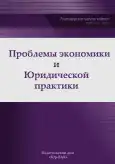Current Issues of Combating the Use of Cryptocurrencies in Drug Trafficking and the Distribution of Pornography
- Authors: Ponamorenko V.E.1,2, Smetanina S.S.3
-
Affiliations:
- Russian Foreign Trade Academy of the Ministry for Economic Development of Russia
- Financial University under the Government of the Russian Federation
- MIREA—Russian Technological University
- Issue: Vol 19, No 3 (2023)
- Pages: 52-58
- Section: Public Law (State and Legal Sciences)
- URL: https://journal-vniispk.ru/2541-8025/article/view/145587
- EDN: https://elibrary.ru/WASXAO
- ID: 145587
Cite item
Abstract
Cryptocurrencies have become a popular tool for shadow operations because of their anonymity and security. Some countries are already actively taking measures to combat this phenomenon, but this is not always effective due to the possibility of performing shadow operations through anonymous networks. The issue of tracking criminal transactions with cryptocurrencies and combating their use in drug trafficking and pornography is becoming increasingly relevant. The purpose of the article is to analyze various methods of combating criminal transactions using cryptocurrency. One of these methods is the use of blockchain technology, which allows you to track all transactions related to cryptocurrency. The article also discusses methods of combating the use of cryptocurrencies in drug trafficking and the distribution of pornography. One of these methods is the use of specialized programs to monitor Internet traffic and identify suspicious transactions with cryptocurrency. These programs allow you to identify not only financial transactions, but also the location of the participants in the transaction. Legislative measures are important tools in the fight against criminal activity in cryptocurrency. Some countries have developed a legislative framework for controlling cryptocurrency transactions and tracking non-prohibited transactions. Despite all efforts, the problem of tracking criminal transactions with cryptocurrency remains relevant. This is due to the fact that anonymous networks, such as Tor or VPN, allow you to hide the location of the identification data of the participants in the transaction. Therefore, in order to more effectively combat criminal transactions with cryptocurrency, it is necessary to continue to develop new methods and technologies. The article concludes that the methods of combating the criminal use of cryptocurrencies can be strengthening the legislative framework and regulation of the use of cryptocurrencies, as well as expanding the jurisdiction of law enforcement agencies and increasing the number of employees specializing in tracking cryptocurrency transactions.
Keywords
Full Text
##article.viewOnOriginalSite##About the authors
Vladislav E. Ponamorenko
Russian Foreign Trade Academy of the Ministry for Economic Development of Russia; Financial University under the Government of the Russian Federation
Author for correspondence.
Email: AML@vavt.ru
SPIN-code: 2140-7613
Dr. Sci. (Law), Associate Professor, Professor of the Department of Public Law; Professor of the Higher School of Jurisprudence and Management
Russian Federation, Moscow; MoscowSvetlana S. Smetanina
MIREA—Russian Technological University
Email: smetankaaaas@mail.ru
the Department of Applied Law
Russian Federation, MoscowReferences
- Bersenev, E.V. Identification and prevention of illegal activities of persons organizing and participating in the phenomenon of webcam / E.V. Bersenev, R.S. Hamidullin // National security / nota bene. —2022. —No. 4.
- Dolgieva, M.M. Foreign experience of legal regulation of relations in the sphere of cryptocurrency turnover // Lex Russica. —2018. —№10 (143).
- Zemtsova, S.I. Cryptocurrency in illicit drug trafficking: issues of deanonymization and responsibility // Criminalistics: yesterday, today, tomorrow. —2020. —№1 (13).
- Ivantsov, S.V. Crimes related to the use of cryptocurrencies: the main criminological trends / S.V. Ivantsov, E.L. Sidorenko, B.A. Spasennikov, Yu.M. Berezkin, Ya.A. Sukhodolov // Russian Journal of Criminology. —2019. —Vol. 13, No. 1. —pp. 85–93.
- Ischuk Y. G., Pinkevich T. V., Smolyaninov E. S. Digital criminology: a textbook. —Moscow. Academy of Management of the Ministry of Internal Affairs of Russia, 2021. —244 p.
- Sidorenko, E. L. Drugs and cryptocurrency: global criminological trends / E. L. Sidorenko // Drug Control. —2018. —No. 2. —pp. 8–13.
- Sidorenko, E.L. Cryptocrime as a new criminological phenomenon // Society and law. —2018. —№2 (64).
- Chuprova, A.Yu. Responsibility for the dissemination of pornography using information technologies in the law of the USA // Legal Science and practice: Bulletin of the Nizhny Novgorod Academy of the Ministry of Internal Affairs of Russia. —2014. —№4 (28).
- Shagrov, R. A. The use of cryptographic currency for the purpose of legalizing proceeds from crime / R.A. Shagrov, K.V. Shvetsov // Fundamental and applied research in the field of management, economics and trade: proceedings of theRussian scientific-practical and educational-methodical conference, St. Peters¬burg, May 30–02 2022 year. Volume Part 1. —St. Petersburg: Federal State Autonomous Educational Institution of Higher Education «Peter the Great St. Petersburg Polytechnic University», 2022. —pp. 294–298.
- Sharapov, R. D. Cryptocurrency: criminal-legal aspect / R.D. Sharapov, R. V. Minin, E. O. Kapaeva // Legal science and law enforcement practice. —2018. —№ 2(44). —Pp. 42–49.
- Shchurova, A.S. Illicit drug trafficking and their analogues using computer technologies (the Internet): criminal law and criminological research: specialty 12.00.08 - criminal law and criminology; criminal enforcement law: dissertation for Doctor of Law / A.S. Shchurova —St. Petersburg, 2017. —256 p.
- Williams K.S. Textbook on Criminology / K.S. Williams. —Oxford: Univ. Press, 2012. —640 p.
Supplementary files








